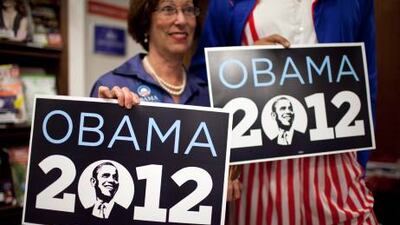CAIRO // Reactions from across the Middle East and North Africa to Barack Obama's re-election yesterday were subdued but hopeful about a US president who has struck a more cosmopolitan tone in the region's affairs.
In 2008, after winning his first election, Mr Obama stood before a huge crowd at Cairo University and declared in a landmark speech that he would seek "a new beginning" in US-Muslim relations. But the past four years have proven US foreign policy in the region is where the gap between rhetoric and action often yawns the widest.
Mohamed Samir, 30, a financial systems consultant in Cairo, said he - like many Egyptians - was relieved that Mr Obama had been re-elected over Republican candidate Mitt Romney. "Obama is closer to Egyptians and the Arabs," he said. "Romney, I think, is farther from us."
"Maybe in the future, there will be more dialogue and there will be change going forward," Mr Samir said, echoing the comments of Egypt's president Mohammed Morsi, who said in a terse statement yesterday that "we hope the newly elected US administration will work to achieve the interests of both the American and Egyptian people".
Of the pledges he made after his first election, Mr Obama's promise that "America will not turn our backs on the legitimate Palestinian aspiration for dignity, opportunity, and a state of their own" was seen as his greatest failure. Peace between Israel and the Palestinians is nowhere in sight and Mr Obama has clashed with Israeli prime minister Benjamin Netanyahu on a variety of sensitive issues.
Saeb Erekat, the lead Palestinian peace negotiator, said he hoped Mr Obama would finally pressure Israel to "implement the conditions needed for a two-state solution".
But some Palestinians interviewed yesterday were sceptical that a re-elected Mr Obama would push for a Palestinian state, let alone end the Israeli occupation.
"Everyone thought Obama would help us, but he always sides with Israel," said Ahmed Abdeen, 27, a manager at a home-appliance shop in Ramallah. "We don't like him."
Mr Netanyahu congratulated Mr Obama in a brief statement, saying: "The strategic alliance between Israel and the US is stronger than ever."
In Iraq, the importance of the US elections was diminished - a stark contrast from four years ago when the US military was more deeply entrenched in the country. Many across the region, however, saw Mr Obama as a president who was less likely to engage in large-scale wars in the name of American national security.
Former Iraqi MP Mufeed Al Jazaeiri said that Mr Obama was a safer bet for the Middle East because the Republican Party "always stands with war options, which could have brought more wars to Iraq and to the region".
In Iran, some sighed with relief at Mr Obama's re-election. "It made my day," said Sima, a businesswoman in Tehran who, like many Iranians, got up early to follow the tense electoral denouement. "I and my friends expected war if Romney won."
Even Iran's semi-official Fars news agency, affiliated to the hardline Revolutionary Guards, appeared relieved. "Republican's elephant crushed by Democrat's donkey," it trumpeted, referring to the symbols of the two US parties.
The volatile aftermath of the Arab Spring uprisings and the rise of followers of political Islam into power has created a complicated challenge for the Obama administration, forcing policymakers to come up with ways to restore security while allowing democracies to make their own way.
Yemen is still facing an insurgency; Libya is grappling with armed militias threatening the unity of the country and Bahrain's political deadlock has escalated with bombings. In Egypt, the country is facing a financial crisis that could destabilise its new-found democracy while the West believes Iran is forging ahead with building a nuclear weapon, increasing the likelihood of conflict with Israel. Syria is locked in civil war where the death toll rises every day without an end in sight.
Despite the instability created by the Arab Spring and the possibility of more conflict on the horizon, many still see Mr Obama as an advocate of peace.
"President Obama will press for human rights and democracy to leave his marks in history," said Jasim Husain, a former MP and economist in Bahrain. "Also, the re-election reinforces the drive for peace rather than wars in the region especially with regards to Iran."
In Yemen, where the campaign of suspected US drone strikes against Al Qaeda militant that has killed dozens of civilians, there are mixed reactions to Mr Obamba's re-election.
Ali Al Kulabi, a store owner in Sanaa, who stayed up all night to wait for the US election results, said he was relieved that Republicans did not take power. "Obama is not blood thirsty," he said. "He knew the US government had a bad reputation in the Middle East and one of his top priorities was to polish the US reputation that was damaged by the [previous] Bush government. He helped America gain the support and respect of many who lost hope in it."
In Sirte, a stronghold of support for the former leader of Libya, Muammar Qaddafi, large chunks of the town were destroyed by last year's US-backed armed rebellion.
Feelings about American politics were mixed, but the consensus at the lively university campus was that Mr Obama's victory was probably for the best.
"There's an old saying that the one you know is better than the one you don't know," said Hassan Gunnay, 22. "We know Obama, but not Romney."
bhope@thenational.ae
* With additional reporting from Alice Fordham, Hugh Naylor, Elizabeth Dickinson, Michael Theodoulou, Nizar Latif, Ben Gittleson and Hakim Almasmari

